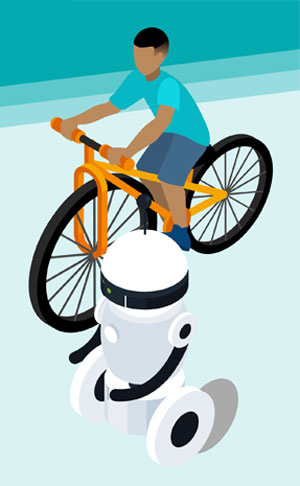Generation Alpha—those born between 2010 and 2025—will grow up in a world in which artificial intelligence is part of everyday life. Robots will read them bedtime stories, and autonomous cars will chauffer them around without a need to ever learn to drive.
copyright by theinstitute.ieee.org
 Those are some of the takeaways from “ Generation AI: A Study of Millennial Parents of Generation Alpha Kids ,” an IEEE survey conducted in June. Six hundred parents between the age of 20 and 36 with at least one child 7 years old or younger were asked how they thought AI technology would impact the lives of their Generation Alpha children. Here’s an overview of how AI likely will be used during each stage of a child’s life.
Those are some of the takeaways from “ Generation AI: A Study of Millennial Parents of Generation Alpha Kids ,” an IEEE survey conducted in June. Six hundred parents between the age of 20 and 36 with at least one child 7 years old or younger were asked how they thought AI technology would impact the lives of their Generation Alpha children. Here’s an overview of how AI likely will be used during each stage of a child’s life.
Toddlers and their AI friends
Infants and toddlers will have toys and other AI devices that will help raise them, according to the survey. Forty percent of parents surveyed said they’re likely to supplement or replace a human nanny with a robot. The Institute wrote about two robot nannies on display at this year’s Consumer Electronics Show, held in Las Vegas. Kuri is a robot that can navigate around the home and can tell bedtime stories to kids. Digital assistant Aristotle automatically recognizes when a baby wakes up and soothes the child back to sleep with a lullaby. “Using built-in cameras as well as voice-recognition capabilities in AI toys can help parents raise their toddlers,” says IEEE Member Sukanya Mandal, a professor of data science at Dev Bhoomi Institute of Technology, in Mumbai.
Gadets to answer all questions
And instead of asking parents all their questions—“Why is the sky blue?”—children could turn to Amazon’s Echo, Apple’s Siri, or another robot to seek out such information. “A gadget or bot could easily replace a human in some specific kids’ activities and tasks,” says IEEE Senior Member Edson Prestes, who heads the theoretical informatics department at the Federal University of Rio Grande do Sul, in Brazil. IEEE Member David Hanson has already developed such a helper: a miniature robotic Albert Einstein that uses AI to engage students in math and science through interactive games. The bot can answer questions about those subjects as well as banter about celebrities and food. […]
read more – copyright by theinstitute.ieee.org


Generation Alpha—those born between 2010 and 2025—will grow up in a world in which artificial intelligence is part of everyday life. Robots will read them bedtime stories, and autonomous cars will chauffer them around without a need to ever learn to drive.
copyright by theinstitute.ieee.org
Toddlers and their AI friends
Infants and toddlers will have toys and other AI devices that will help raise them, according to the survey. Forty percent of parents surveyed said they’re likely to supplement or replace a human nanny with a robot. The Institute wrote about two robot nannies on display at this year’s Consumer Electronics Show, held in Las Vegas. Kuri is a robot that can navigate around the home and can tell bedtime stories to kids. Digital assistant Aristotle automatically recognizes when a baby wakes up and soothes the child back to sleep with a lullaby. “Using built-in cameras as well as voice-recognition capabilities in AI toys can help parents raise their toddlers,” says IEEE Member Sukanya Mandal, a professor of data science at Dev Bhoomi Institute of Technology, in Mumbai.
Gadets to answer all questions
And instead of asking parents all their questions—“Why is the sky blue?”—children could turn to Amazon’s Echo, Apple’s Siri, or another robot to seek out such information. “A gadget or bot could easily replace a human in some specific kids’ activities and tasks,” says IEEE Senior Member Edson Prestes, who heads the theoretical informatics department at the Federal University of Rio Grande do Sul, in Brazil. IEEE Member David Hanson has already developed such a helper: a miniature robotic Albert Einstein that uses AI to engage students in math and science through interactive games. The bot can answer questions about those subjects as well as banter about celebrities and food. […]
read more – copyright by theinstitute.ieee.org
Share this: